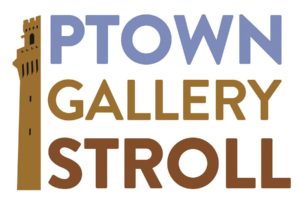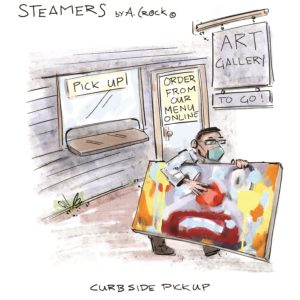PROVINCETOWN — As of this week, art lovers can stroll past many of Provincetown’s galleries without getting up from their living room couches.
A new website, ptowngallerystroll.com, was launched by a coalition of 28 galleries that are working together to plan for the future of America’s oldest continuous art colony. The site is named for the beloved Friday night event that was popular before the days of Covid.
 The idea first came out of a board meeting of the nonprofit Provincetown Commons, headed by Jill Stauffer, whose mission is to buoy the Provincetown arts community through shared workspaces and economic initiatives. The Stroll group started with five galleries: Four Eleven, Stewart Clifford, Adam Peck, On Center, and Rice Polak. Those reached out to others.
The idea first came out of a board meeting of the nonprofit Provincetown Commons, headed by Jill Stauffer, whose mission is to buoy the Provincetown arts community through shared workspaces and economic initiatives. The Stroll group started with five galleries: Four Eleven, Stewart Clifford, Adam Peck, On Center, and Rice Polak. Those reached out to others.
Now the group has three working committees: safety, website, and marketing. Jill Rothenberg-Simmons of On Center, who is head of the safety committee, said its members are developing guidelines for capacity, crowd control, sanitization, and mask-wearing. They are planning bulk purchases of disinfectant, hand sanitizer, gloves, and masks. Because “every gallery is different” in terms of size and layout, it will be up to the individual galleries to determine exactly how many people they allow in at one time. Debbie Nadolney of AMP Gallery has designed a sign for the galleries to put up showing safety rules.
As retail businesses, galleries fall under phase two of Gov. Baker’s plan for restarting the economy. The earliest they may be able to reopen is June 8, and they will need to heed government protocols.
Gallery owner Greg Salvatori designed the group’s logo and website. The landing page is a “virtual stroll,” updated every Friday night with photographs and videos of artwork for sale by the participating galleries. Another part of the website facilitates in-person visits, listing galleries and their contact information.
Mike Carroll of the Schoolhouse Gallery explains that “the website committee deals with the nuts and bolts, while the marketing committee is the bigger picture.” The Ptown Gallery Stroll will have a strong presence on social media and has a small budget for advertising.
“We want to communicate that we are still in business,” Stewart Clifford, co-chair of the marketing committee, said, “leveraging our collective voice to build a virtual audience.”

As with anything, there is a learning curve, and in some ways an age gap, in terms of the gallery owners’ comfort with online platforms. Liz Carney of Four Eleven Gallery has proposed hiring high school interns to help out, who in turn would gain experience in arts administration.
Why did it take a pandemic to create this kind of collaboration among galleries?
“In my 30 years of owning a gallery,” said Marla Rice of Rice Polak, “we have tried and failed to form this type of thing many times before.” She suggests that the group’s success this time is related to the Commons taking the lead.
Carroll said that, while there have been some previous collaborations, including an effort around 20 years ago called Campus Provincetown, this new group formed “because there is a real threat of there not being a season this year.”
Some gallerists remarked that the Ptown Gallery Stroll has introduced them to galleries outside their bubbles. “We never get to meet because during the summer we are stuck in our boxes,” said Salvatori.
While joining a mutually beneficial collective sounds like a “no brainer,” in the words of Marla Rice, there are a handful of Provincetown galleries that are not involved. The $100 entry fee is unlikely to be much of a deterrent.
James Balla of Albert Merola Gallery wrote in an email to the Independent that, while he initially participated in the group, he decided to leave because “we didn’t feel like we were adding anything to the stated goals, and did not feel in agreement with ideas about PPE, and special signage or common hours.” While he is making his own decisions about safety and reopening, he is staying in touch with the other galleries.
Regarding the art market this summer, Marla Rice said, “I am extremely worried, but then again, I am always a worrier.” Greg Salvatori, on the other hand, is enthusiastic about online sales and the international art market: “Until last year, my online sales were less than 10 percent. The Covid situation changed and refined my understanding of this. I have actually had better April and May sales this year than last year.”
Pete Hocking of Four Eleven Gallery, who is vice chair of the Commons, said that 30 percent of his sales are online. It is also possible that, as people spend more time in their homes and less money on travel, restaurants, or clothes, the art market may not suffer too much this summer.
Many are confident about the group’s future and believe it to be a valuable model for other types of arts organizations. Jill Rothenberg-Simmons said, “Hopefully, this is a group that will survive the pandemic.”



